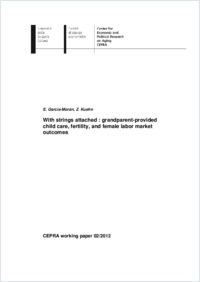With strings attached : grandparent-provided child care, fertility, and female labor market outcomes
- Garcia-Moran, Eva Center for Economic and Political Research on Aging (CEPRA), Facoltà di scienze economiche, Università della Svizzera italiana, Svizzera
- Kuehn, Zoe Departmento de Economia Cuantitativa, Universidad Complutense de Madrid, Madrid, España
-
13.09.2012
52 p.
English
Grandparents are regular providers of free child care. Similar to any other form of child care, availability of grandparent-provided child care affects fertility and labor market decisions of women positively. We find that women in Germany, residing close to parents or in-laws are more likely to have children and that as mothers they are more likely to hold a regular part-or fulltime job. However, different from any other type of child care, for individuals to enjoy grandparent-provided child care on a regular basis, residence choices must coincide with those of parents or in-laws. Thus while living close provides access to free child care, it imposes costly spatial restrictions. We find that hourly wages of mothers residing close to parents or in-laws are lower compared to those residing further away, and having relatives taking care of ones' children increases the probability of having to commute. We build a general equilibrium model of residence choice, fertility decisions, and female labor force participation that can account for the relationships between grandparent-provided child care, fertility and female labor market outcomes. We simulate our model to analyze how women's decisions on residence, fertility, and labor force participation change under distinct scenarios regarding availability of grandparent provided childcare and different family policies.
- Language
-
- English
- Classification
- Economics
- License
-
License undefined
- Open access status
- green
- Identifiers
-
- RERO DOC 30338
- ARK ark:/12658/srd1318457
- Persistent URL
- https://n2t.net/ark:/12658/srd1318457
Statistics
Document views: 172
File downloads:
- Texte intégral: 253
